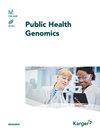解释是一个营销问题吗?对人工智能信任的追求和两个相互冲突的解决方案。
IF 1.3
4区 医学
Q4 GENETICS & HEREDITY
引用次数: 8
摘要
本文章由计算机程序翻译,如有差异,请以英文原文为准。
Is Explanation a Marketing Problem? The Quest for Trust in Artificial Intelligence and Two Conflicting Solutions.
a Department of Oncology and Hemato-Oncology, University of Milan, Milan, Italy; b Applied Research Division for Cognitive and Psychological Science, IEO, European Institute of Oncology IRCCS, Milan, Italy; c Division of Early Drug Development for Innovative Therapy, IEO, European Institute of Oncology IRCCS, Milan, Italy Received: November 27, 2019 Accepted: January 20, 2020 Published online: January 28, 2020
求助全文
通过发布文献求助,成功后即可免费获取论文全文。
去求助
来源期刊

Public Health Genomics
医学-公共卫生、环境卫生与职业卫生
CiteScore
2.90
自引率
0.00%
发文量
14
审稿时长
>12 weeks
期刊介绍:
''Public Health Genomics'' is the leading international journal focusing on the timely translation of genome-based knowledge and technologies into public health, health policies, and healthcare as a whole. This peer-reviewed journal is a bimonthly forum featuring original papers, reviews, short communications, and policy statements. It is supplemented by topic-specific issues providing a comprehensive, holistic and ''all-inclusive'' picture of the chosen subject. Multidisciplinary in scope, it combines theoretical and empirical work from a range of disciplines, notably public health, molecular and medical sciences, the humanities and social sciences. In so doing, it also takes into account rapid scientific advances from fields such as systems biology, microbiomics, epigenomics or information and communication technologies as well as the hight potential of ''big data'' for public health.
 求助内容:
求助内容: 应助结果提醒方式:
应助结果提醒方式:


